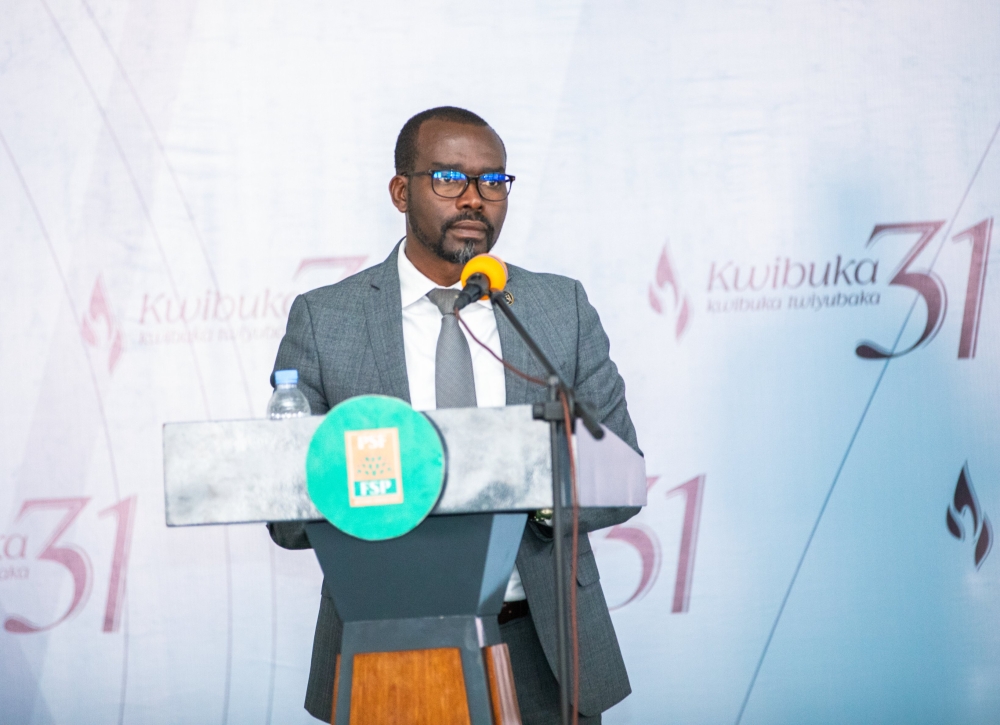Bahizi urged PSF members to resist division and hatred, and instead foster collaboration, patriotism, and forward-thinking leadership.


The Minister of Trade and Industry, Prudence Sebahizi, has called on members of Rwanda’s private sector to uphold unity and resilience, and to never allow the country's tragic past to divide their collective strength.
Speaking on April 25 during the commemoration of businesspeople killed during the 1994 Genocide against the Tutsi, the minister emphasised the importance of remaining united and patriotic. The event was held at PSF headquarters in Gikondo Sector, Kicukiro District.
ALSO READ: Kwibuka: PSF commemorates businesspeople killed during Genocide
"Even at the family level, the values we teach and the examples we set shape our society. What we say and do, whether positive or negative, leaves an impact,” Sebahizi said, stressing that in Rwanda’s history, both heroes and perpetrators emerged by choice, not by accident.
"We must choose to be a light in everything we do. Our identity and pride as Rwandans come from our actions, our mindset, and our collective efforts.”
ALSO READ: Genocide survivor: &039;My scholarship was rejected several times because I was Tutsi'
The minister highlighted the vital role of the private sector in Rwanda’s development journey, noting that in the early years after the genocide, many Rwandans ventured into entrepreneurship at a time when government jobs were scarce.
"Today, the work done by entrepreneurs is the backbone of Rwanda’s economic progress. That is something to be proud of,” he said. "Even if some foreign countries stop their support, what matters is that we remain focused and united, knowing our independence and our destiny lie in our own hands.”
He urged PSF members to resist division and hatred, and instead foster collaboration, patriotism, and forward-thinking leadership.
Sadate Munyakazi, a businessman who survived the 1994 Genocide, emphasised the need to nurture a spirit of love and reconciliation.
"How can we expect development when we teach hatred or glorify violence? It’s impossible,” Munyakazi said. "We must teach love, remember the past not to repeat it, and work for a future where peace and dignity prevail.”
He added that sustainable development is only possible when there is a stable and united nation. "Before we talk about infrastructure and business growth, we must first secure peace, peace that rejects genocide, discrimination, and hate.”
Munyakazi’s story
Munyakazi, who was 12 during the genocide, said that before the genocide started, his family faced killings and harassment, as he was also being harassed by classmates.
He vividly recalls the morning of April 7, 1994. When he was going to milk the cows, the family’s maid rushed back from fetching water, dropped her jerrycan, exclaiming, "Habyarimana is dead.”
ALSO READ: I&M Bank honours 26 employees killed in 1994 Genocide, commits to support families
Shock and fear quickly spread.
His father was happy, while his mother was frightened, saying, "we are finished.”
That same day, when his father left their home in search for more information on Habyarimana’s death, he was confronted by the local mayor, Charles Kagabo, with accusations, increasing the family’s fear. That night was the last they spent at home.
On April 14, 1994, Munyakazi was sent by his parents to his uncle’s only to find, upon reaching there, that militia attacks targeting the Tutsi had started there as well. On his way back, he narrowly escaped death when two men with machetes stopped him and asked where he was coming from. Thinking quickly, he lied that he was from a family that wasn't being targeted, so they let him go.
With the threats intensifying, his family fled Kimirama for Mutima in Ntongwe, where Munyakazi’s grandfather lived.
Their house was soon set ablaze. After two nights in Mutima, they were forced to flee again, this time to Ntongwe commune. When Interahamwe militias arrived there, they were again forced to flee to Ruhango sub-prefecture.
The massacres escalated. Interahamwe looted the Tutsi’s homes and shops and openly discussed the killings they had committed. "Just hearing those conversations was traumatic,” said Munyakazi.
Hope returned when he learned that the RPF-Inkotanyi rebels were advancing.
On May 28, Munyakazi and one of his siblings and the family that sheltered them were rescued by RPF soldiers.
After the genocide, he was reunited with a few surviving aunts. At just 12 years old, he was entrusted with the responsibility of leading the family despite his young age.


